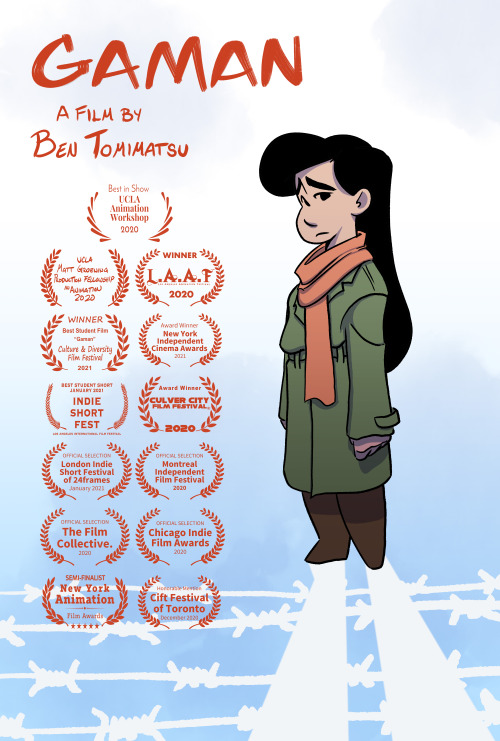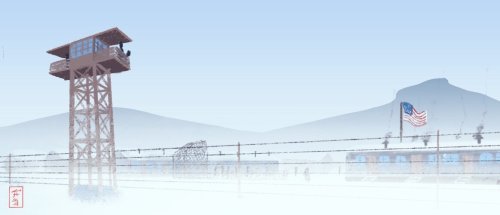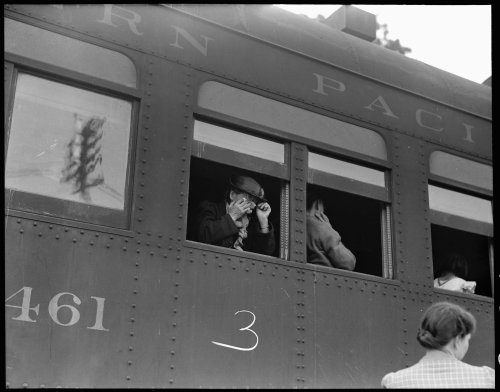#japanese american internment
Today is the 80th anniversary of Franklin D. Roosevelt signing executive order 9066, and creating one of the darkest moments in American history. Upon its signing, over 100,000 Japanese Americans were denied their freedoms and due process. People like my grandparents and great grandparents were denied due process and their freedom, and forced to leave the lives that they fought so hard to create in this country. They would be forced at gunpoint into racetracks and fairgrounds, and finally into trains and buses to Concentration Camps. I created “Gaman” to help people empathize with the plight that so many were forced into by their government, and to start a conversation about this often hidden moment in our history. I am releasing it publically today for everyone to enjoy, and to hopefully inspire those who watch it to look into this history so that we may never repeat it again. Follow the link below to watch my film:https://youtu.be/Vu_RsjR0iy8
Post link
I am proud to announce that my short film Gaman will be screened as part of the Georgia Shorts Film Festival in Atlanta, GA! The festival runs May 1 and 2, with Gaman screening as part of the B group on May 1 4 PM EST both in person at the Rolecall Theater and online! Afterwards, I will be joining my fellow filmmakers for a quick Q&A about our films! Drop on by to watch some great films, link to the festival is posted below and embedded in the image above!
https://cinemalife.ticketspice.com/georgia-shorts-film-festival-2021-virtual
Post link
In honor of this day of remembrance, I thought that I would share a visual development piece for my short film Gaman. On Feb 19, 1942 Franklin D. Roosevelt signed Executive Order 9066, officially starting the internment of Japanese Americans. This was the culmination of decades of Anti-Asian sentiment and racism in the US, and saw over 100,000 Issei, Nissei, and Sansei have their rights and property stripped from them before being forced into concentration camps. Let us have this day to reflect on this horrendous act, and how the same sentiments that created internment manifest today in the US and around the world.
Post link

by KARIN CHAN
A Chicago-based nonprofit founded by a Korean American independent filmmaker and producer has been awarded a $160,000 grant to create a 20-minute dramatic narrative about the Japanese American internment experience during World War II.
The Orange Story: An American Tale, a production of Full Spectrum Features founded by Eugene Sun Park, chronicles the so-called “day of removal” in 1942 following an order authorizing the forced relocation of 120,000 ethnic Japanese from their homes.
The grant is part of the National Park Service’s efforts to preserve the stories and sites of Japanese American internment; this year, a total $2.8 million has been awarded to fund a range of projects.

In a phone interview with KoreAm, Park said the film, directed by Erika Street, is the first phase of a three-year project that will also include an educational website featuring five different short films and personal stories about the Japanese internment through the use of multimedia.
Park, 37, was born in Michigan but moved with his family to New Jersey when he was 5. He grew up in a school district where he was one of only a few Asian Americans. Even at a young age, Park was aware of his outsider status.
“My family stood out,” he recalls. “I don’t remember how many times people referred to me as ‘the nice Chinese boy.’ This was the ’80s—the words ‘Chinese’ and ‘Asian’ were synonymous. My sense of being Asian American or Korean American was a point of embarrassment rather than filling me with any sense of pride. Like most kids, I just wanted to fit in.”
Read full article here.
Woodland, Yolo County, California. Ten cars of evacuees of Japanese ancestry are now aboard and the doors are closed. Their Caucasian friends and the staff of the Wartime Civil Control Administration stations are watching the departure from the platform. Evacuees are leaving their homes and ranches, in a rich agricultural district, bound for Merced Assembly Center about 125 miles away. May 20, 1942. [x]
Post link


Next up is Displacement by Kiku Hughes. The concept for this one is very interesting and I’m excited to finally dive into this story. I think this is the first graphic novel I’ve read about the Japanese American internment camps during WWII. George Takei’s They Called Us Enemy is another graphic novel about the subject and it as been on on tbr list for a while so I’ll have to check my library’s website to see if they’ve got it. Fingers crossed.




